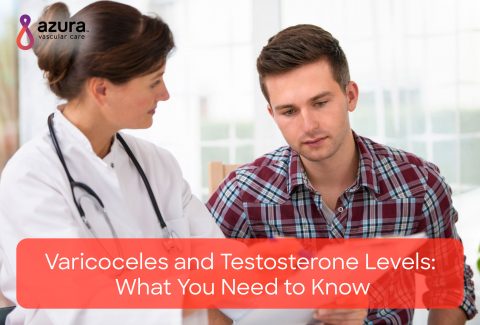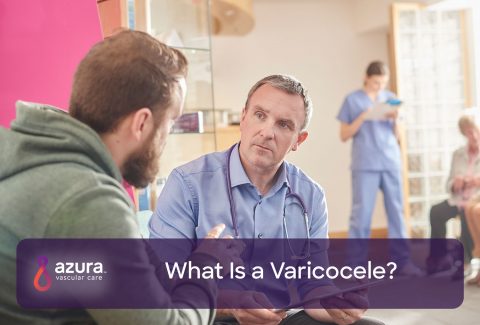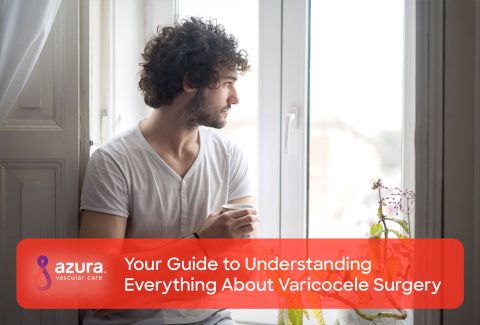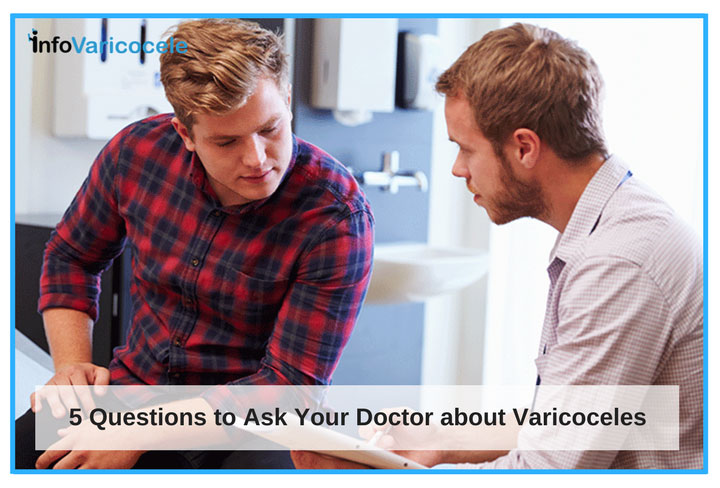
Men with varicocele are often embarrassed to talk about their condition with their doctor. However, once you are diagnosed, you should keep in mind that there is a lot of useful information about your various varicocele treatment options to relieve pain and resolve fertility issues related to this condition. You should be aware of all the facts before making a decision about what the best treatment is for you.
5 Questions to Start the Conversation about Varicocele with Your Doctor.
1. What Is Varicocele?
In the most basic terms, varicocele is a varicose vein that forms inside of your scrotum. Varicoceles may result in changes in your scrotum and/or your testicles. You may notice swelling or shrinking.[i] For many men, varicoceles begin to appear in puberty, although adult men can also develop the condition over time.[ii] Varicocele results when blood flow through the veins in the scrotum is affected in a manner that causes the blood to pool, rather than flow. This flow disruption can cause the affected vein/veins to swell.[iii]
2. What Causes Varicocele?
It is not totally clear what exactly causes varicocele, but
two known contributing factors have been identified:
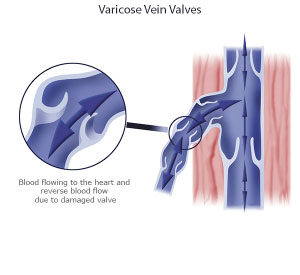 Malfunctioning Venous Valves – In the circulatory system, veins have valves that control the direction of blood flow. Sometimes these valves fail. When this occurs, normal blood flow is disrupted, which may cause the blood to pool rather than flow. Researchers have not found a root cause for why valves in the circulatory system stop working.[iv]
Malfunctioning Venous Valves – In the circulatory system, veins have valves that control the direction of blood flow. Sometimes these valves fail. When this occurs, normal blood flow is disrupted, which may cause the blood to pool rather than flow. Researchers have not found a root cause for why valves in the circulatory system stop working.[iv]- An Accident – Adolescent boys are more prone to have an accident as a cause for their varicocele.[v]
3. Does Varicocele Cause Infertility?
Varicocele has been linked with infertility. In fact, it’s often an appointment with a fertility doctor that leads to the discovery of the condition, because it is not uncommon for men with varicocele to have no symptoms at all.[vi]
Statistics show that in 30% of infertile couples trying to conceive for the first time, varicocele is identified as the primary cause of their infertility.[vii] Moreover, varicocele is a primary infertility factor in 81% of cases of couples trying to conceive a second time.[viii]
The link between varicocele and infertility is related to the potential that varicocele may cause:
- Low sperm count.
- DNA damage to sperm.
- Low semen quality.
- Low testosterone.
RELATED – 30 Stats About Varicocele Infertility That You Did Not Know
4. Do I Need Treatment?
The evidence is inconclusive. Some doctors will tell men with varicocele to forego treatment if they have no symptoms or are not experiencing pain.[ix] Fertility doctors will typically advise men to get the condition corrected in order to increase their chances of conception.[x] Some doctors suggest that correcting varicocele, even those with no obvious symptoms, may be beneficial for long-term physical health because a corrective procedure will likely improve testosterone levels.[xi]
5. What Are My Varicocele Treatment Options?
There are two types of general treatment options to correct varicocele:
- Surgery.
- Varicocele embolization.
Varicocele Surgery
Within the varicocele surgery category, there are 3 different surgical approaches that are used to correct the condition. The three types of surgery are:
- Open surgery.
- Microsurgical approach.
- Laparoscopic surgery.
All three types of surgery involve an incision. One of the primary differences is the size and placement of the incision. Many doctors favor the microsurgical approach; however, there are differing opinions on which technique is the best.[xii]
The important thing to remember about surgery is all three types have similar outcomes in terms of their success and frequency of recurrence. Each approach shows that 1 in 10 men will have a varicocele recurrence.[xiii] Recovery time is about two weeks, and the time until resumption of sexually activity is about four weeks after the surgery.[xiv]
Varicocele Embolization
Varicocele embolization, a minimally invasive approach to varicocele management, is becoming more popular because it is a viable alternative to varicocele surgery. It is performed by an interventional radiologist on an outpatient basis. It typically takes about an hour. The recovery period is, on average, two days, and you should be able to resume sex after a wee
k. Varicocele embolization has proven to have similar results to surgery, and is often recommended for men experiencing a varicocele recurrence.[xv]
RELATED – 9 Things You Must Know about Varicocele Embolization
If you’re wondering about your options for varicocele treatment, consulting your doctor for more information can help you determine whether embolization or surgery would be the best option for treating your varicocele. Men who have pain or who are attempting to have a child may find that solutions are easier than they imagined.
Sources:
[i] http://www.mayoclinic.org/diseases-conditions/varicocele/basics/definition/con-20024164
[ii] http://www.mayoclinic.org/diseases-conditions/varicocele/basics/causes/con-20024164
[iii] http://www.mayoclinic.org/diseases-conditions/varicocele/basics/definition/con-20024164
[iv] http://www.mayoclinic.org/diseases-conditions/varicocele/basics/definition/con-20024164
[v] http://en.allexperts.com/q/Urology-Male-issues-989/2009/12/traumatic-varicocele.htm
[vi] http://www.healthline.com/health/varicocele#
Symptoms3
[vii] http://americanpregnancy.org/infertility/male-infertility/
[viii] http://www.ncbi.nlm.nih.gov/pmc/articles/
PMC2664231/
[ix] http://www.healthline.com/health/varicocele
#Diagnosis5
[x] http://www.webmd.com/infertility-and-reproduction/varicocele-repair-for-infertility
[xi] http://www.nyp.org/news/hospital/goldstein-varicoceles-testosterone.html
[xii] https://www.cornellurology.com/clinical-conditions/male-infertility/
surgical-procedures/microsurgical-varicocelectomy/
[xiii] http://infertility.about.com/od/
causesofinfertility/a/Varicocele-And-Infertility.htm
[xiv] https://myhealth.alberta.ca/health/
aftercareinformation/pages/conditions.aspx?hwid=ug3672
[xv] http://www.sirweb.org/patients/varicoceles/
